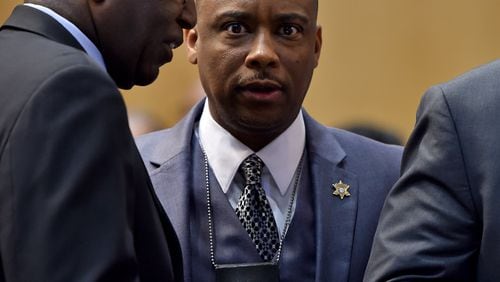Clayton County Sheriff Victor Hill, who calls himself “The Crime Fighter,” was indicted on federal charges Tuesday for allegedly violating the civil rights of jail detainees.
In a 12-page, four-count indictment, filed April 19 but unsealed on Monday, Hill is accused of depriving detainees of their liberty in incidents that occurred over several months in 2020 by strapping them to a restraint chair as a form of punishment.
In many of those incidents, the sheriff, who has been at the center of controversy for years, berated the detainees with profanity, telling them that they were in “his county” and that their rights were limited in his presence, according to the federal document.
”You’re entitled to get the hell out of my county and don’t come back,” Hill is accused of telling one of the defendants who had asked about being entitled to a speedy and fair trial.
In another incident, a defendant identified by federal investigators as “J.H.” was restrained in a chair for several hours and not given access to a restroom. He urinated on himself, the indictment said.
Federal law allows use of a restraint chair to keep inmates from harming themselves or someone else, but the chairs must not be used as a form of punishment.
A restraint chair has shoulder, lap, ankle and wrist straps, and law enforcement officials say it helps keep disruptive prisoners from harming themselves or others.
Civil rights advocates say the devices can be misused by officers. In Gwinnett, federal lawsuits were filed in 2013 and again in 2018 over the county’s Rapid Response Team’s use of the devices. The 2018 lawsuit accused the former Sheriff Butch Conway of excessive force that violated inmates’ constitutional rights.
Hill appeared in Magistrate Judge Russell Vineyard’s courtroom Tuesday afternoon, where he was given a $50,000 appearance bond and told he could not leave the Northern District without prior approval.
He is limited to one firearm, as he is a law enforcement officer, and the four charges can carry up to 10 years in prison per count.
U.S. Attorney Kurt Erskine said Tuesday that Hill abused his power as sheriff and “must be held accountable.”
Hill’s attorney, Drew Findling, told Channel 2 Action News that the charges were “disgraceful.”
The legal action against Hill comes as he has fought back years of accusations of bullying and strong-arm tactics in policing and running the Clayton County jail.
These new allegations paint a damning picture of abuse, federal authorities say.
In April 2020, a boy identified as “C.H.”, and who had just turned 17 was arrested for allegedly vandalizing his home during an argument with his mother. Seated in the back of a deputy’s vehicle, the arresting officer took a picture of the youth, who had been apprehended without resistance and was cooperative.
He texted the photo to Hill. Hill asked the detainee’s age.
“17,” the deputy wrote.
“Chair,” Hill replied.
The indictment also said Hill verbally abused “C.H.” and “J.H.” Hill taunted them with curse words, saying he would make them sit in the chair for 16 hours if they ever crossed paths with him again in jail.
Hill also used the restraints on defendant “G.H.” after the man became entangled in a dispute over landscaping work for a Clayton County deputy in Butts County, the indictment states. The sheriff called the landscaper and told him to stop harassing his employee after the worker sought payment for the yard work. Hill later swore out a warrant for arrest against the landscaper for “harassing communications.”
A day later, Hill sent a “fugitive squad armed with handguns and AR-15 rifles to Butts County in an attempt to arrest G.H. on the misdemeanor arrest warrant,” the indictment said.
The landscaper spent hours restrained in a chair after his arrest on Hill’s orders, the indictment said.
The FBI searched Hill’s office in June 2020, months after a number of the alleged incidents took place. But the federal agency declined at the time to say what agents were looking for or what had been found.
Aggressive tactics, still popular
Hill fired 27 employees immediately after taking office in 2005, placing snipers on the sheriff’s department roof as they were escorted out. In 2012, he was accused of several counts of racketeering, theft by taking and making false statements, though he would later be acquitted of all charges.
And in 2015, he accidentally shot a friend while demonstrating “police tactics” during a date. His law enforcement certification was later put on probation for two years by the Georgia Peace Officer Standards and Training Council.
In 2018, he arrested the wife of a would-be rival for his office and later took the candidate into custody as well.
Last year, the Southern Center for Human Rights and the ACLU of Georgia filed lawsuits claiming the sheriff was not doing enough to protect inmates against COVID-19, including housing three detainees in cells meant for two prisoners.
“We are unsurprised by the allegations described in the federal indictment of Sheriff Hill,” said Cody Cutting, equal justice works fellow at the Center. “After nearly a year of advocating for people in the Clayton County Jail, we know that these stories only begin to scratch the surface of the sheriff’s callous and cruel treatment of those he is supposed to protect.”
In recent years, federal authorities also sought records from Clayton County related to Mitzi Bickers, a central figure in the Atlanta City Hall corruption investigation, who works under Hill as a chaplain for the sheriff’s office.
Bickers, who formerly worked at Atlanta City Hall as director of human services, is under indictment and faces trial next year in an alleged cash-for-contracts scheme. Bickers is accused of using her influence with the city to help steer contracts to a pair of construction company CEOs who have already pleaded guilty.
Hill has not been accused of any wrongdoing in connection with the Atlanta City Hall probe.
Despite his controversies, he has remained popular with many residents of the south metro community, handily winning re-election in 2020. He became sheriff in 2005, but lost re-election in 2008. He ran again in 2012 and won, holding the office ever since.
Staff reporters J. Scott Trubey and Christian Boone contributed to this story.
MORE DETAILS
Clayton County Sheriff Victor Hill is accused in a four-count indictment of using a restraint chair to punish jail detainees, which is forbidden by federal law.
Hill appeared in court Tuesday, where he was given a $50,000 appearance bond and told he could not leave the Northern District without prior approval.
The four charges can carry up to 10 years in prison per count.
Sheriff Victor Hill’s timeline
Jan. 1, 2005: Assumed the office of sheriff. Terminated 27 employees and had them escorted from the building with snipers posted on the roof.
Aug. 5, 2008: Hill lost the Democratic primary to Kem Kimbrough, taking 49 percent, or 12,335 votes, to the 13,107 cast for Kimbrough. Hill stops coming to the office.
Dec. 30, 2008: Hill files for bankruptcy, listing as debts judgments owed as a result of lawsuits brought by employees and others. He leaves office the next day.
Jan. 18, 2012: Hill is indicted on four counts of racketeering, 29 counts of theft by taking, two counts of making a false statement and one count each of violation of oath of a public officer and influencing a witness. Prosecutors say he used his office and his campaign money for himself and not the intended purposes.
Aug. 21, 2012: Hill defeats Kimbrough in the Democratic primary runoff, taking almost 13,000 votes, 54 percent.
Oct. 16, 2012: Clayton judge Albert Collier dismisses five of 37 felony charges against Hill, writing that it is unclear who owns the 2008 campaign funds so Hill cannot be charged with improperly spending them.
Nov. 6, 2012: Hill wins the general election.
Nov. 26, 2012: Hill’s trial delayed until the Georgia Court of Appeals determines if the trial judge was correct when he dismissed five of the original 37 charges.
Jan. 3, 2013: Gov. Nathan Deal says state law does not allow him to suspend Hill while his criminal charges are pending because the sheriff was not in office when he was indicted.
Feb. 12, 2013: Georgia Court of Appeals hears arguments based on the decision to dismiss five of the original 37 felony counts. Ruling is pending.
May 2013: The Court of Appeals rules in Hill’s favor, dismissing five of the original 37 felony cases against him.
August 8, 2013: Testimony begins in Hill’s trial. Charges against him include racketeering and theft, with allegations that he used his county-issued vehicle and credit card for personal benefit. Prosecutors urged jurors to send a message that elected officials must be held accountable for breaking faith with voters and using their public offices for personal gain. Defense attorney Drew Findling countered that Hill has earned the trust of voters and is being persecuted by political enemies.
August 15, 2013: After one day of deliberations, jurors clear Hill on all counts. He resumes his duties as Clayton sheriff.
September 2013: Three current and former employees of the Clayton Sheriff’s Office sue Hill for allegedly retaliating against them because, in 2005, they were successful in lawsuits against him. The county would eventually paid the plaintiffs $750,000 as part of a settlement deal
May 2015: Hill calls 911 in Gwinnett County to say he shot a woman in the abdomen. Hill said he had accidentally shot McCord while he was practicing “police tactics,” Gwinnett DA Danny Porter said. But the statements Hill made about the position of McCord’s body and the location of the weapons found at the model home where McCord worked did not match what police found, Porter said.Hill was charged with reckless conduct. McCord, 43, told authorities the shooting was an accident.
August 2016: Hill pleads no contest to the reckless conduct charge. “It’s like it never happened,” said his attorney, Mike Puglise, noting that, under Georgia’s First Offender Act, Hill maintained a clean criminal record. But soon after, Hill’s Peace Officers Standard and Training Council certification was suspended for two years. Hill remained sheriff.
September 2016: Hill wins the Democratic primary with 63 percent of the vote. In November, he was re-elected to his third term.
July 2017: An AJC investigation reveals chaplains in Hill’s office were required to attend one funeral every week, during which they hand-delivered a form letter offering condolences signed by Hill.In one email, he wrote, “This is a priority to me. Criminals in jail are not.”
August 2018: An ex-Clayton County deputy who planned to run against Sheriff Victor Hill in 2020 turns himself into police after his former boss issued warrants for his arrest.Robert Hawes was charged with filing false documentation and violation of oath of office. One week earlier, Hawes’ wife, Gerrian, was arrested over several emails she sent Hill. The sheriff said the emails were harassing and that Gerrian Hawes refused to discontinue the communication even after he asked her to stop.
July 2019: Mitzi Bickers, indicted in connection with a federal bribery probe at Atlanta City Hall, receives a promotion in her job with the Clayton sheriff. She’s now the county’s chief chaplain. She had previously worked as a campaign adviser.
November 2019: Hill fires two deputies for “cowardly behavior” after they allegedly ran from gunfire that left one man dead.
July 2020: In a lawsuit filed Wednesday in U.S. District Court for the Northern District of Georgia, Hill is accused by several civil rights groups of an indifferent reaction to the global pandemic. According to the suit, Hill did not provide masks for inmates, and instead of practicing social distancing, the Clayton jail has, in some cases, put three people in cells meant for two.
November 2020: Hill is re-elected to a fourth term.






